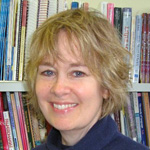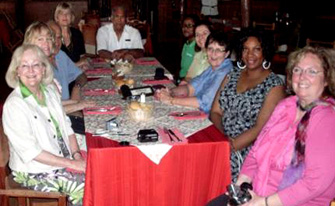
by Ann A. Kennedy
In May 2011, in response to an e-mail invitation from IRA’s Director of Global Affairs, Sakil Malik, a delegation of eight IRA members gathered at Miami’s airport in anticipation of six days of literacy research in Cuba. The delegation was comprised of our chair, Dr. Adelina Arellano-Osuna (Venezuela), Dr. Annelie Ferreira (South Africa), Dr. Annatjie Hanekom (South Africa), Dr. George Kamberelis (WY, USA), Dr. Ann Kennedy (VA, USA), Dr. Judy Leavell (TX, USA), Leah Perrotti (CA, USA), and Patricia Robinson (MI, USA).
We were well aware of the reports of adult literacy rate in Cuba (100%, according to UNICEF) since the National Literacy Campaign of 1961 and were eager to study the influence of this movement on the Cuban education system 50 years later. The e-mail outlined a program that included briefings with educators, visits to cultural sites, school sites, and community program sites, but the reality of the trip was infinitely more impressive…and interactive.
Picturesque Historical Setting

Like many visitors, we saw the Gran Teatro, Old Havana, the Plaza de la Revolución, and the Plaza de la Catedral while taking in the truly well-maintained Ford, Buick, and Pontiac models of the 1950s that passed us. We enjoyed the cabaret at the National Hotel and were duly impressed by the open air book markets at the Plaza de Armas as well as the treasures in a warehouse of island crafts.
We immediately got used to the ubiquitous images of Che and Fidel on official buildings, neighborhood fences, as well as on school and classroom walls. We were fortunate that our hotel overlooked the Malecón, the esplanade that stretches along the coast, and which allowed for excellent people watching.
Brigandistas Taught Basic Literacy Skills
Beyond the initial cultural attention, we engaged in research activities. We were given a private tour of the National Literacy Museum by its director and learned about the volunteer brigadistas who taught basic literacy skills to 700,000 Cubans in less than one year. We saw artifacts of the campaign (books, hammocks, uniforms, and a symbolic lantern) and letters of gratitude addressed to Fidel Castro. We met with officials, but mostly with educators, i.e., future student teachers of English, classroom teachers, librarians, former brigadistas, and university professors and observed in elementary and secondary classrooms. In fluent English, the teachers-in-training admitted to listening to American songs (from the 1970s) and following along with the lyrics. At some meetings, the presentations of professors were scripted; at other times, there was a free exchange of ideas.
We spent an afternoon at the Escuela Abel Santamaria (a school for the blind) and learned about their pedagogy using limited, older but successful materials. Many student groups entertained us with songs, but the musical performances by the blind students were particularly memorable.
In central Havana, we observed a fourth grade class that was having instruction for the month at the central city library; a read-aloud and group discussion was led by an engaging librarian. We were privileged to join the discussion and were told that many of the eight-year-olds’ favorite titles were by Jose Martí and other national heroes. However, there was visible excitement when our leader, Adelina Arellano-Osuna, read her own children’s book to the group. Students clamored afterward to hold and re-read the book.
We also sat in on early childhood classrooms and observed emergent literacy techniques for manipulating letters during phonics instruction.
Access to Cheaply Priced Books
The aforementioned popular open air book market in Old Havana with its stalls of sun-faded book covers was evidence of Cubans’ love of literacy. We saw many instances of Cubans spending free time reading.
We were given a sticker that reads, espera leyendo [reading while waiting] and told that books are left at bus stops and in waiting rooms with the sticker visible—an invitation to read while waiting. We were guests of employees of a small publishing company and learned about their philosophy of making sure books were affordable to all Cubans.
We were subsequently escorted to a bookstore across the street from the publisher’s office and saw books priced at the equivalent of US pennies. Former brigadistas continue in literacy outreach to other nations experiencing high illiteracy rates. Many times our hosts in schools or offices would bemoan the fact that we would not be in Havana for its International Book Fair, an event that obviously gave them national pride.
Inspired National Literacy Effort
With the reality of a monolingual population and the transparent sound-letter correspondence of Spanish, Cuba does not appear to have the same challenges which delegates from both South Africa and the United States share in advancing literacy proficiency in their respective nations. However, to this delegation of researchers, we found Cuba and Cubans to be inspired and inspiring in advocating for the need for developing literacy at the national level.
Our group is very appreciative of the complex and extensive collaboration between IRA and the Cuban officials that made this experience possible.
Pictured above, left to right: Judith Leavell, Ann Kennedy, George Kamberelis, Annatjie Hanekom, [driver], [tour guide], Adelina Arellano-Osuna, Annelie Ferreira, Patricia Robinson, and Leah Perrotti.
Ann A. Kennedy is an adjunct professor at Georgetown University and English/Reading Specialist at Arlington Mill High School in Arlington, VA.
This article is reprinted from the August/September 2012 issue of Reading Today. IRA members can read the interactive digital version of the magazine here. Nonmembers: join today!